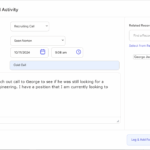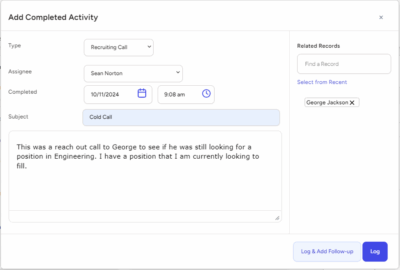In the bustling realm of talent acquisition for agency recruiters, search consultants are continually challenged to navigate through a sea of candidates to identify the perfect match for their clients. With technology evolving at breakneck speed, the recruitment landscape has undergone a paradigm shift, with recruitment software emerging as the cornerstone of modern talent acquisition strategies.
This extensive guide aims to delve deep into the significance of recruiting software for agency recruiters and search consultants, offering an in-depth analysis of crucial functionalities such as applicant tracking, recruitment customer relationship management (CRM), sourcing tools, and reports and analytics.
Software and Talent Acquisition for Agency Recruiters
The journey of recruiting software from its nascent stages to its current state of sophistication is a testament to the relentless pursuit of efficiency and effectiveness in talent acquisition for agency recruiters. In the early days, recruitment processes were predominantly manual, relying heavily on paper-based documentation and spreadsheets to manage candidate data. However, as the demand for talent grew and the competition intensified, recruiters realized the need for a more streamlined and scalable approach to hiring.
The evolution of recruiting software can be attributed to several factors, including advances in technology, changes in candidate behavior, and the growing complexity of recruitment processes. The advent of applicant tracking systems (ATS) marked a significant milestone in the evolution of recruiting software, providing recruiters with a centralized platform to manage the entire recruitment lifecycle seamlessly. With features such as job posting, resume parsing, interview scheduling, and candidate communication, ATS revolutionized the way recruiters sourced, screened, and hired candidates.
The Evolution of Recruiting Software
As recruitment practices continued to evolve, so did the capabilities of recruiting software. The integration of recruitment CRM functionality added a new dimension to talent acquisition, enabling recruiters to build and nurture relationships with candidates and clients alike. By centralizing communication, tracking interactions, and storing relevant data, recruitment CRM empowered recruiters to personalize outreach, anticipate needs, and provide a superior candidate and client experience.
Sourcing tools emerged as another critical component of recruiting software, addressing the growing need to identify and engage passive candidates. With the proliferation of social media and professional networking sites, recruiters realized the potential of tapping into untapped talent pools beyond traditional job boards. Sourcing tools leveraged advanced search algorithms and AI-driven technologies to scour the web for candidates with the right skills and experience, enabling recruiters to expand their talent pipelines and gain a competitive edge in talent acquisition.
Reports and analytics functionality rounded out the evolution of recruiting software, providing recruiters and search consultants with valuable insights into the effectiveness of their recruitment strategies. By tracking key metrics such as time-to-fill, cost-per-hire, and quality-of-hire, reports and analytics enabled recruiters to measure performance, identify trends, and make data-driven decisions. Moreover, predictive analytics capabilities empowered recruiters to anticipate hiring needs, forecast trends, and optimize their recruitment efforts for better outcomes.
Applicant Tracking: Streamlining the Hiring Process
Applicant tracking lies at the core of recruiter software, serving as the backbone of the hiring process for agency recruiters and search consultants. At its essence, applicant tracking is designed to streamline and automate various recruitment tasks, allowing recruiters to manage candidate data, track job openings, and collaborate with hiring teams efficiently.
One of the primary functions of applicant tracking systems is job posting, enabling recruiters to advertise job openings across multiple channels with ease. Whether it’s posting on job boards, career sites, or social media platforms, applicant tracking systems streamline the process of distributing job postings and reaching a wider audience of candidates. Moreover, advanced ATS platforms offer features such as job syndication, which automatically distributes job postings to a network of partner sites, maximizing visibility and reach.
Resume parsing is another essential feature of applicant tracking systems, allowing recruiters to extract relevant information from resumes and store it in a structured format. By automatically parsing resumes and populating candidate profiles with key data points such as work experience, education, and skills, ATS platforms eliminate manual data entry and accelerate the screening process. This not only saves recruiters time but also ensures consistency and accuracy in candidate evaluation.
Enhanced Collaboration and Communication
Interview scheduling is often cited as one of the most time-consuming aspects of the recruitment process. Applicant tracking systems streamline this process by providing recruiters with tools to schedule interviews seamlessly. With features such as calendar integration and automated reminders, ATS platforms simplify the process of coordinating interview schedules and ensure timely communication with candidates and hiring teams.
Collaboration is essential in any recruitment process, especially for agency recruiters and search consultants who often work with dispersed teams and clients. Applicant tracking systems facilitate collaboration by providing a centralized platform for communication and information sharing. Recruiters can easily collaborate with hiring managers, share candidate profiles, and solicit feedback—all within the ATS platform. Moreover, ATS platforms offer role-based access control, allowing recruiters to control user permissions and ensure data security.
Recruitment CRM: Building Relationships for Long-Term Success
In the competitive landscape of talent acquisition for agency recruiters, building and nurturing relationships with candidates and clients is crucial for long-term success. Recruitment CRM functionality equips agency recruiters and search consultants with the tools to manage candidate and client interactions effectively, fostering meaningful connections and driving positive outcomes.
Centralized communication is the cornerstone of recruitment CRM, enabling recruiters to manage all candidate and client interactions from a single platform. Whether it’s email correspondence, phone calls, or in-person meetings, recruitment CRM platforms provide a centralized repository for storing communication history, ensuring that recruiters have a complete view of all interactions at their fingertips.
Tracking engagement is essential for understanding candidate and client preferences and tailoring outreach accordingly. Recruitment CRM platforms offer robust engagement tracking capabilities, allowing recruiters to monitor email open rates, click-through rates, and response rates. By analyzing engagement metrics, recruiters can identify which candidates and clients are most receptive to their outreach efforts and adjust their strategies accordingly.
Relationships: The Key to Talent Acquisition for Agency Recruiters
Storing relevant data is critical for building and maintaining relationships with candidates and clients. Recruitment CRM platforms enable recruiters to capture and store a wide range of data points, including contact information, job preferences, and communication history. By maintaining accurate and up-to-date records, recruiters can personalize outreach, anticipate needs, and provide a superior candidate and client experience.
Segmentation is key to effectively managing candidate and client relationships at scale. Recruitment CRM platforms allow recruiters to segment their database based on various criteria such as job function, industry, and location. By segmenting their database, recruiters can tailor their outreach efforts to specific audience segments, increasing the relevance and effectiveness of their communications.
Automation is a powerful tool for streamlining repetitive tasks and improving efficiency. Recruitment CRM platforms offer automation capabilities that allow recruiters to automate various aspects of their workflow, from email campaigns to follow-up reminders. By automating routine tasks, recruiters can focus their time and energy on building relationships and driving positive outcomes.
Sourcing Tools: Tapping into Talent Pools
In today’s competitive talent market, finding the right candidates requires more than just posting job openings on job boards. Sourcing tools play a crucial role in helping agency recruiters and search consultants identify and engage passive candidates, tapping into hidden talent pools across various channels.
Advanced search capabilities are at the heart of sourcing tools, enabling recruiters to conduct targeted searches based on specific criteria such as skills, experience, and location. Whether it’s Boolean search strings or natural language processing, sourcing tools leverage advanced algorithms to scour the web for candidates who meet the desired qualifications. By narrowing down the candidate pool to those who are the best fit for the role, sourcing tools help recruiters save time and effort in the candidate sourcing process.
Social media has emerged as a goldmine for talent sourcing, with platforms like LinkedIn, Facebook, and Twitter providing access to millions of professionals across various industries. Sourcing tools integrate with social media platforms, allowing recruiters to search for candidates, engage with them, and build relationships directly within the platform. Moreover, some sourcing tools offer social listening capabilities, allowing recruiters to monitor conversations and identify potential candidates who may not be actively looking for job opportunities.
LinkedIn is Just the Start of Sourcing
Professional networking sites such as LinkedIn have become indispensable tools for recruiters seeking to connect with passive candidates. Sourcing tools offer features such as LinkedIn integration, enabling recruiters to search for candidates, view their profiles, and reach out to them directly from within the sourcing tool interface. By leveraging professional networking sites, recruiters can tap into vast talent pools and access candidates who may not be actively searching for jobs.
Referral programs are a proven way to tap into existing networks and source high-quality candidates. Sourcing tools offer features that enable recruiters to create and manage referral programs, incentivize employee referrals, and track referral activity. By leveraging employee networks, recruiters can tap into trusted sources of talent and access candidates who are pre-screened and vetted by their peers.
AI-driven sourcing tools are revolutionizing the way recruiters identify and engage candidates. Powered by machine learning algorithms, AI-driven sourcing tools analyze vast amounts of data to identify patterns and predict candidate behavior. By leveraging AI, recruiters can uncover hidden talent pools, identify top candidates, and personalize outreach at scale, leading to better hiring outcomes.
Reports and Analytics: Driving Data-Driven Decision-Making
In the era of big data, reports and analytics have emerged as powerful tools for driving data-driven decision-making in talent acquisition for agency recruiters. For agency recruiters and search consultants, reports and analytics provide valuable insights into the effectiveness of their recruitment strategies and enable them to make informed decisions that drive better outcomes for their clients.
Key metrics such as time-to-fill, cost-per-hire, and quality-of-hire are essential indicators of recruitment performance. Reports and analytics platforms enable recruiters to track these metrics over time, compare performance across different job roles and locations, and identify areas for improvement. By measuring performance against key metrics, recruiters can identify bottlenecks, streamline processes, and optimize their recruitment efforts for better results.
Pipeline analytics provide recruiters with visibility into the health of their talent pipelines and the progress of candidates through the recruitment process. Reports and analytics platforms offer pipeline visualization tools that allow recruiters to track the status of candidates at each stage of the hiring process, identify potential roadblocks, and take proactive measures to keep the pipeline moving. By monitoring pipeline metrics such as candidate conversion rates and time spent at each stage, recruiters can identify areas for improvement and make data-driven decisions to optimize their recruitment workflow.
Superior Talent Acquisition for Agency Recruiters
Source effectiveness analysis is essential for understanding which channels are driving the best candidates and the highest return on investment (ROI). Reports and analytics platforms enable recruiters to track the source of candidates, analyze the effectiveness of different sourcing channels, and allocate resources accordingly. By identifying the most effective sourcing channels, recruiters can focus their efforts on channels that yield the best results and optimize their recruitment budget for maximum impact.
Candidate experience analytics provide insights into the candidate journey and help recruiters identify opportunities to enhance the candidate experience. Reports and analytics platforms allow recruiters to track candidate feedback, measure satisfaction levels, and identify pain points in the recruitment process. By analyzing candidate experience metrics such as application completion rates, time-to-response, and interview satisfaction scores, recruiters can identify areas for improvement and implement strategies to enhance the overall candidate experience.
Predictive analytics capabilities enable recruiters to forecast hiring needs, anticipate trends, and make proactive decisions that drive better outcomes. Reports and analytics platforms leverage historical data and machine learning algorithms to predict future hiring demand, identify potential talent shortages, and recommend strategies for addressing workforce gaps. By leveraging predictive analytics, recruiters can stay ahead of the curve, anticipate hiring needs, and build agile recruitment strategies that adapt to changing market conditions.
Top Echelon and Talent Acquisition for Agency Recruiters
Top Echelon’s recruiting software represents a paradigm shift in talent acquisition for agency recruiters, catalyzing efficiency, precision, and scalability in the pursuit of top-tier candidates. At its core, the platform integrates a potent blend of advanced technology and intuitive design, empowering recruiters to navigate the intricate landscape of talent acquisition with finesse.
One of the standout features of Top Echelon’s software is its comprehensive candidate sourcing capabilities. Through sophisticated algorithms and expansive databases, recruiters gain access to a vast pool of potential candidates, spanning diverse industries and skill sets. This breadth of reach ensures that recruiters can identify the ideal candidate for any given role, irrespective of niche or specialization.
Moreover, the platform streamlines the candidate evaluation process, leveraging AI-driven analytics to assess candidate suitability based on a multitude of factors, from experience and qualifications to cultural fit and soft skills. This data-driven approach not only expedites the screening process but also enhances the accuracy of candidate selection, minimizing the risk of mismatches and optimizing long-term retention rates.
Furthermore, Top Echelon’s recruiting software fosters collaboration and communication within recruitment teams, facilitating seamless coordination and knowledge sharing. Recruiters can leverage shared pipelines, real-time updates, and customizable workflows to streamline operations and maximize productivity.
In addition to its robust functionality, Top Echelon’s software distinguishes itself through its user-friendly interface and personalized support services. Recruiters can navigate the platform with ease, leveraging its intuitive features to expedite tasks and achieve optimal results. Meanwhile, dedicated support teams stand ready to provide guidance and assistance, ensuring that recruiters extract maximum value from the software’s capabilities.
Get a Free Trial of Top Echelon Software!
In essence, Top Echelon’s recruiting software represents a transformative tool, revolutionizing talent acquisition for agency recruiters through its unparalleled blend of technology, efficiency, and support. By harnessing the power of innovation, the platform empowers recruiters to transcend traditional limitations, driving superior outcomes and propelling organizational success.
For search consultants eager to witness the transformative potential of Top Echelon Software firsthand, we offer free recruitment software as part of our trial. This trial grants unrestricted access to nearly all features and functionalities for a limited duration. (Please note: The emailer feature becomes available upon subscription initiation.)
This opportunity enables users to delve into the platform’s capabilities, assess its suitability for their requirements, and experience the advantages it can bring to their workflow. To enroll in a free trial of our recruiting software, simply click HERE to commence.
For those who prefer a more tailored approach, we also extend an invitation to a personalized recruiting software demo conducted by our team of experts. During this session, we’ll guide you through the platform, address any queries you may have, and illustrate how our recruitment automation tools can revolutionize your workforce. To arrange a live demo, click HERE.
Furthermore, we encourage you to peruse our recruitment software pricing page. Here, you’ll discover that our software offers both formidable capabilities and affordability, a combination critical for success.








